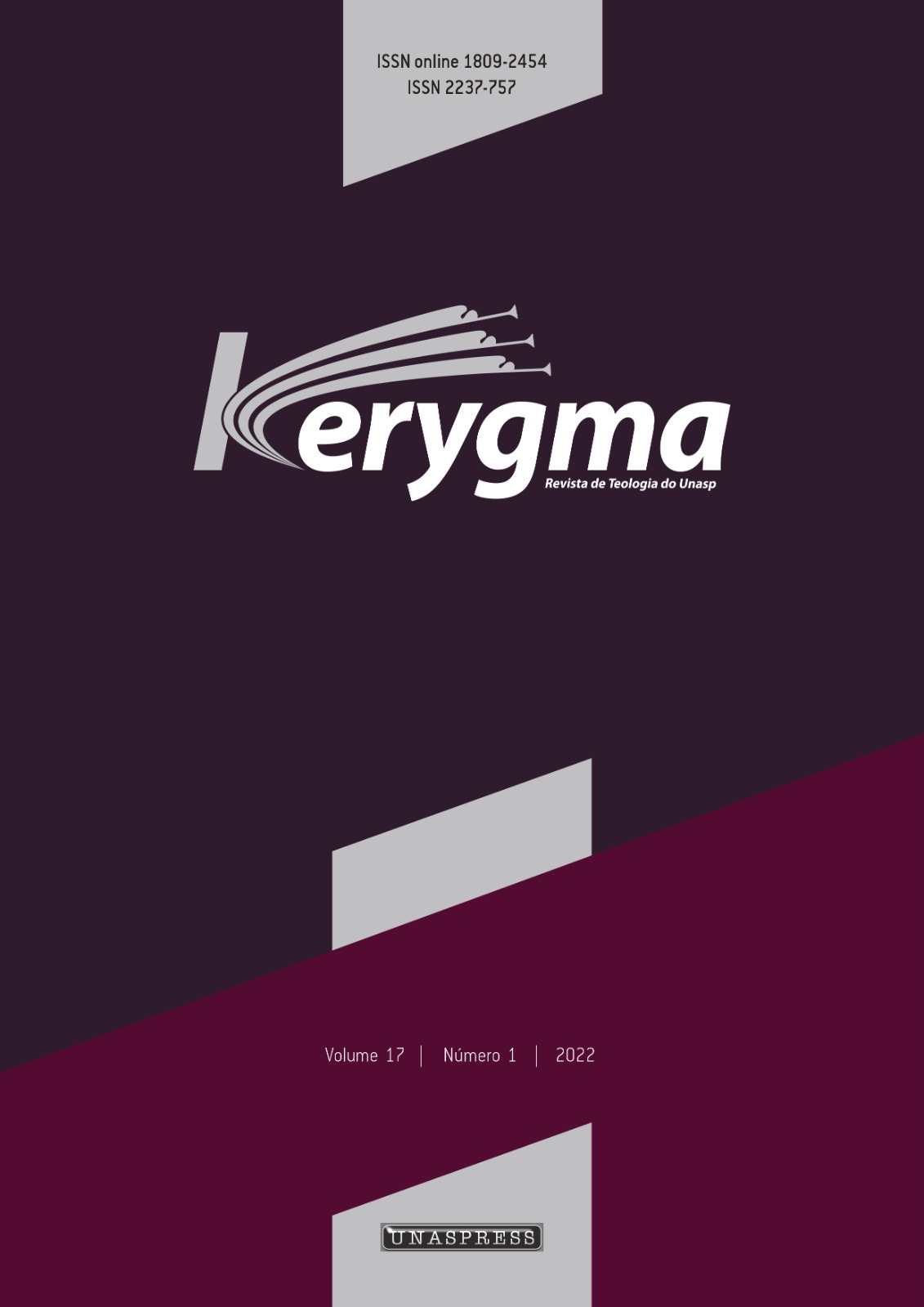O Deus teísta existe
DOI:
https://doi.org/10.19141/1809-2454.kerygma.v17.n1.pe01553Palavras-chave:
Deus, Existência, Evidências, teísmoResumo
O presente artigo irá trabalhar o conceito de que entre os vários argumentos a favor de Deus, todos eles mostram que há apenas um Deus, não muitos. E que esse Deus deve ser infinito, pois está além do mundo finito que criou. Esse Deus deve ser pessoal, porque Ele é inteligente e moral, sendo o Projetista Inteligente e o Legislador da Lei Moral. Além disso, o presente artigo conclui que esse Deus é espiritual e sobrenatural, pois está além do mundo físico e natural. Ele também pode fazer milagres porque já fez o maior milagre de todos – Ele criou o mundo. Assim, percebemos que a evidência aponta para a existência de um Deus, conforme a cosmovisão teísta – um Ser infinito, inteligente, perfeito, pessoal e sobrenatural.
Downloads
Referências
AUGUSTINE, S. Confessions. Oxford: Oxford University Press, 2009.
AQUINAS, T. Summa theologica. Westminster: Christian Classics, 1981.
BARROW, J. D. The anthropic cosmological principle. Oxford: Oxford University Press, 1988.
BEHE, M. Darwin’s black box. Florence: Free Press, 2006.
BEHE, M. The edge of evolution. Florence: Free Press, 2007.
BUDZISZEWSKI, J. Objections, obstacles, acceptance. Collins: Ignatius Press, 2006.
BUDZISZEWSKI, J. The revenge of conscience. Eugene: Wipf & Stock Publishers, 2010.
CAMUS, A. The rebel: an essay on man in revolt. Visalia: Vintage, 1992.
COLLINS, F. The language of God: a scientist presents evidence for belief. Florence: Free Press, 2007.
CRAIG, W. L. The Kalam cosmological argument. Eugene: Wipf & Stock Publishers, 2000.
CRICK, F. Life itself: its origin and nature. New York: Simon & Shuster, 1981.
DAWKINS, R. The blind watchmaker: why the evidence of evolution reveals a universe without design. New York: W. W. Norton & Company, 1987.
FEUERBACH, L. The essence of Christianity. Buffalo: Prometheus, 1989.
FLEW, A. There is a God: how the world’s most notorious atheist changed his mind. San Francsico: HarperOne, 2008.
FREUD, S. The future of an illusion. New York: W. W. Norton & Company, 1989.
FROOM, E. Psychoanalysis and religion. New Haven: Yale University Press, 1959.
GEISLER, N. L. Philosophy of religion. 2nd ed. Eugene: Wipf & Stock Publishers, 2003.
GEISLER, N. L. God: a Philosophical Argument. Eugene: Bastion Books, 2015.
HEEREN, F. Show me God: what the message from space is telling us about God. Wheeling: Search Light, 1995.
HOYLE, F. Evolution from space. New York: Simon & Shuster, 1982.
HUME, D. The letters of David Hume, vol. I. Oxford: Oxford University Press, 1932.
JASTROW, R. A. Scientist caught between two faiths: an interview with Robert Jastrow. Christianity Today. 26 (13):15, 1982.
JASTROW, R. A. Interview. Christianity Today, August 6, 1983.
JASTROW, R. A. God and the astronomers. New York: W.W. Norton, 1992.
LEWIS, C. S. Mere Christianity. San Francsico: HarperOne, 2001.
LEWIS, C. S. The abolition of man. San Francsico: HarperOne, 2015.
LEWONTIN, R. New York Review of Books, September 1, 1996.
NIETZSCHE, F. Thus spoke Zarathustra. Mineola: Dover Publications, 1999.
NIETZSCHE, F. The antichrist. Mineola: Dover Publications, 2018.
PINNOCK, C. H. Most moved mover: a theology of God’s openness. Eugene: Wipf & Stock Publishers, 2019.
RUSSELL, B. Letter to Lady Ottoline. 13 dec. 1911.
SAGAN, C. Cosmos. New York: Random House, 1980.
SAGAN, C. Broca’s brain: reflections on the romance of science. Novato: Presidio Press, 1986.
SANDAGE, A. A scientist reflects on religious belief. Truth, vol. 1. Dallas: Truth Incorporated, 1985.
SARTRE. J. P. The words: Jean Paul Sartre’s autobiography. Visalia: Vintage, 1981.
YOCKEY, H. Self organization origin of life scenarios and information theory. The Journal of Theoretical Biology, vol. 91, July 7, 1981.
Downloads
Publicado
Como Citar
Edição
Seção
Licença
Copyright (c) 2022 Norman L. Geisler

Este trabalho está licenciado sob uma licença Creative Commons Attribution 4.0 International License.
Declaração de direitos autorais
Em síntese, autores que publicam na Kerygma devem concordar que:
-
Após a aceitação, os direitos autorais dos artigos são transferidos à Kerygma.
-
Todo material de terceiros utilizado no texto deve estar corretamente referenciado.
-
Os autores devem possuir autorização para uso de imagens, tabelas e demais materiais gráficos.
-
Os autores asseguram que o texto é original, de sua autoria, e não foi submetido ou publicado em outro veículo.
-
As ideias e opiniões expressas são de responsabilidade exclusiva dos autores, não refletindo necessariamente a posição da revista.
-
Os editores reservam-se o direito de realizar ajustes textuais e adequações às normas editoriais.
-
Os autores mantêm os direitos autorais e concedem à revista o direito de primeira publicação, sob licença Creative Commons Atribuição–Não Comercial 4.0 Internacional.
-
Os autores autorizam a reprodução e adaptação do material pela Kerygma, mediante participação ou autorização expressa quando necessário.
-
A revista poderá distribuir, armazenar, arquivar e disponibilizar os artigos por quaisquer meios físicos ou digitais, gratuitos ou pagos.
-
Os autores podem firmar contratos adicionais para distribuição não exclusiva do trabalho, com menção à publicação original na Kerygma.
-
A reprodução integral ou parcial dos textos em outros meios requer autorização prévia e escrita do editor.
-
Os autores são autorizados e incentivados a divulgar seus trabalhos online antes ou durante o processo editorial, visando ampliar seu impacto acadêmico.














